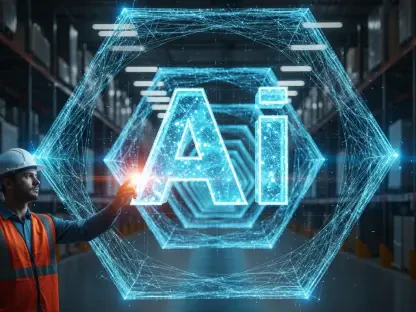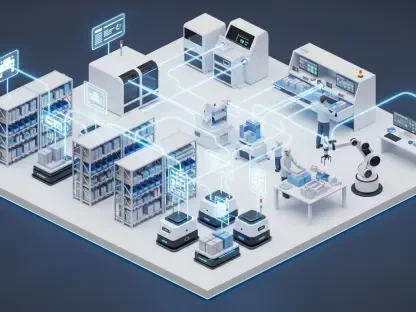Digitalization is revolutionizing industries worldwide, with logistics at the forefront of this transformation. Embracing technologies like Electronic Data Interchange (EDI) is pivotal in optimizing operations, improving efficiency, and building sustainable practices. Companies such as Girteka exemplify the benefits and advancements brought by integrating digital solutions in logistics.
The Role of Digitalization in Logistics
Foundations of Digitalization
Digitalization has become essential for modern business operations, impacting industries worldwide, including logistics. Less than 40% of companies have fully digitized their processes, presenting a significant opportunity for technological enhancement. Logistics, by its nature, involves complex data management and coordination, making it a prime candidate for digital innovation.
Sophisticated digital tools enable companies to track shipments in real-time, automate documentation, and optimize routes. These improvements lead to faster delivery times, reduced operational costs, and enhanced customer satisfaction. Additionally, digitalization supports scalable growth, allowing companies to handle increased volumes without a proportional increase in resources. This holistic approach to modernization is transforming logistics from a traditionally manual industry into a highly efficient, tech-driven sector.
Girteka’s Initiative
As a leading logistics company, Girteka leverages digitalization to optimize services and promote responsible logistics practices. Implementing EDI solutions is central to their strategy, aimed at enhancing road transport services. By focusing on technology, Girteka has been able to streamline its operations significantly, proving the tangible benefits of a digital-first approach.
Over the past several years, Girteka has seen a tenfold increase in EDI usage. This substantial growth reflects a broader industry trend where automation and digital solutions are becoming indispensable. For Girteka, the integration of EDI technology has resulted in improved data accuracy, increased processing speeds, and notable cost savings. Their commitment to digital innovation is not just about staying competitive; it is about creating a sustainable and efficient logistics network that can adapt to future demands.
Understanding Electronic Data Interchange
EDI Explained
Electronic Data Interchange (EDI) refers to electronically structured data transmission between organizations, replacing traditional paper documents. This technology standardizes data formats, reducing manual entry and errors while streamlining processes. EDI enables seamless exchange of information such as invoices, orders, and shipment notifications, leading to more efficient and transparent logistics operations.
The importance of EDI in logistics cannot be overstated. By ensuring data accuracy and reliability, EDI minimizes the risk of human errors that can cause delays and additional costs. Further, standardized data formats facilitate smoother communication between different systems and platforms, enhancing interoperability. This is particularly crucial in logistics, where timely and accurate data exchange is critical for operational efficiency and customer satisfaction.
Key Benefits of EDI
Integrating EDI in logistics operations offers several advantages. Efficiency gains, scalability, and transparency are primary outcomes that enhance decision-making and overall operations. By automating the data transfer process, EDI eliminates the need for time-consuming manual tasks, reducing the potential for errors and speeding up transaction times. This boosts operational efficiency and allows companies to reallocate resources to more strategic activities.
Scalability is another significant benefit of EDI. As logistics companies expand their operations, the volume of data that needs to be processed increases substantially. EDI is well-suited to handle large-scale, repetitive data transfers common in the logistics industry, making it easier to manage growth and complexity. Additionally, the transparency offered by EDI provides minute-by-minute tracking of logistics operations. This real-time visibility is invaluable for optimizing routes, managing inventory, and making informed decisions quickly.
The Impact on Customer and Partner Relationships
Efficiency and Accuracy
Automation through EDI reduces manual errors significantly, with studies showing a reduction of up to 80%. This accuracy translates into faster processing times for orders, invoices, and updates. Efficient data exchange not only enhances accuracy but also minimizes discrepancies that can lead to costly disputes and delays. Automated workflows ensure that information is transferred seamlessly between systems, reducing the workload on staff and allowing them to focus on higher-value tasks.
Real-time data updates are another critical advantage of EDI. Instant access to accurate information enables logistics companies to respond swiftly to any issues that arise, minimizing disruptions and maintaining high levels of service quality. This capability is particularly important in a fast-paced industry like logistics, where timely and accurate information is crucial for meeting customer expectations and maintaining operational efficiency.
Strengthened Relationships
With real-time data transmissions, EDI fosters quick responses and transparent communication, thereby building stronger client trust and loyalty. Transparent communication is essential for maintaining strong relationships with customers and partners. When clients know that they can rely on accurate and timely information, their confidence in the logistics provider increases, leading to higher satisfaction and loyalty.
Stronger relationships are not just beneficial for customer retention; they also enhance collaboration with partners. EDI enables seamless communication between different stakeholders in the supply chain, facilitating better coordination and cooperation. This improved collaboration helps to optimize logistics operations, reduce costs, and enhance service quality. Additionally, the reliability and consistency of EDI data contribute to more effective decision-making, further strengthening relationships and fostering long-term partnerships.
Global Market Trends and Sustainability
Market Growth
The global digital market, including EDI solutions, is poised for growth, especially driven by the manufacturing and retail sectors. EDI has long been vital in Europe’s logistics, particularly among high-volume shippers and retailers. The increasing demand for efficient and reliable data exchange solutions is fueling the adoption of EDI across various industries. The continued growth of e-commerce and the need for real-time data updates are key drivers of this trend.
In response to these market demands, logistics companies are investing in digital solutions to remain competitive and meet customer expectations. EDI’s ability to handle large-scale data exchanges efficiently makes it an attractive option for businesses looking to optimize their logistics operations. As more companies recognize the benefits of digitalization, the adoption of EDI is expected to continue accelerating, further transforming the logistics landscape.
Sustainability Benefits
From a sustainability perspective, EDI helps reduce paper usage and administrative overhead, contributing to more accurate load planning and minimizing emissions. By eliminating the need for physical documents, EDI significantly reduces paper waste and lowers the environmental impact of logistics operations. This aligns with the growing emphasis on sustainable business practices and environmental responsibility in the industry.
Accurate load planning is another critical sustainability benefit of EDI. By providing real-time data on shipments, EDI enables logistics companies to optimize their routes and load capacities, reducing fuel consumption and lowering carbon emissions. This not only helps to mitigate the environmental impact of logistics but also supports cost savings and operational efficiency. As companies strive to achieve their sustainability goals, EDI will play a crucial role in promoting responsible logistics practices.
Innovations in Digital Solutions
AI/ML-Driven Document Reading
Innovations like AI and machine learning-driven document reading are reducing manual tasks by seamlessly converting various file formats into structured data, enhancing efficiency. These technologies can process and interpret information from Excel files, PDFs, and email text, converting them into standardized data formats compatible with EDI systems. This automation reduces the need for manual data entry, minimizing errors and saving time.
The integration of AI and machine learning into EDI solutions also enhances data accuracy and reliability. By continuously learning from data patterns and improving their algorithms, these technologies can identify and correct discrepancies in real-time, further improving the efficiency of logistics operations. The ability to automate complex data processing tasks not only streamlines workflows but also allows logistics companies to focus on more strategic initiatives, driving innovation and growth.
Flexible Integration Options
Offering multiple data exchange formats, Girteka ensures flexible integration for partner businesses, simplifying the process and accommodating various customer needs without extensive system overhauls. This flexibility is crucial in an industry where diverse systems and platforms are commonplace. By supporting various data formats, Girteka can seamlessly integrate with different partners, ensuring smooth and efficient data exchange.
Flexible integration options also enhance the customer experience by making it easier for businesses to adopt EDI solutions without significant disruptions to their existing systems. This approach minimizes the need for extensive system modifications, reducing implementation costs and facilitating faster onboarding. By offering tailored integration solutions, Girteka can meet the unique needs of its customers, fostering stronger partnerships and driving operational efficiency.
Enhancing Transparency and Autonomy
Customer Portal Self-Service
Girteka’s customer portal initiative aims to provide greater visibility and autonomy, reducing reliance on manual communications and offering on-demand access to shipment statuses and documentation. These self-service portals empower customers to track their shipments in real-time, access important documents, and manage their logistics operations more effectively. The increased transparency and control provided by these portals enhance the customer experience and build trust.
By reducing the need for manual communications, customer portals also streamline workflows and minimize the risk of errors. Customers can access the information they need when they need it, without having to wait for manual updates from logistics providers. This real-time access to data not only improves operational efficiency but also enhances customer satisfaction by providing a seamless and responsive service.
Real-Time Data Integration
Combining traditional EDI technology with real-time APIs and advanced analytics, Girteka’s digital solutions streamline logistics processes, reducing errors, and improving accuracy across the supply chain. Real-time data integration enables logistics companies to respond quickly to changes and disruptions, ensuring that operations remain efficient and effective. This capability is particularly important in a dynamic industry like logistics, where timely information is crucial for decision-making and performance optimization.
The use of advanced analytics further enhances the value of real-time data integration. By analyzing data trends and patterns, logistics companies can identify opportunities for improvement, optimize routes, and predict potential issues before they arise. This proactive approach to data management supports continuous improvement and drives operational excellence. The integration of traditional and modern digital solutions creates a comprehensive and robust logistics system that can adapt to future challenges and opportunities.
The Future of EDI and Logistics
Reliable Foundations
Despite advancements, EDI remains fundamental due to its compatibility with older systems and reliability, ensuring efficient cooperation between companies. The established infrastructure and standardized formats of EDI make it a reliable and trusted solution for data exchange in logistics. Its proven track record of enhancing operational efficiency and reducing errors underscores its continued relevance in the industry.
As logistics companies continue to embrace digital transformation, EDI will remain a critical component of their technology stack. Its ability to integrate with newer digital solutions, such as APIs and advanced analytics, ensures that it can adapt to evolving industry needs while maintaining its core functionalities. This reliability and adaptability make EDI an indispensable tool for logistics providers looking to optimize their operations and deliver exceptional service.
Emerging APIs
Digitalization is shaking up industries globally, and logistics stands at the forefront of this significant shift. Adopting technologies like Electronic Data Interchange (EDI) is crucial for optimizing operations, boosting efficiency, and establishing sustainable practices. This technological revolution is transforming traditional logistical practices into advanced, efficient, and environmentally friendly operations. For example, companies like Girteka are showcasing the myriad benefits and innovations brought through the incorporation of digital solutions in logistics. These advancements not only streamline operations but also enhance accuracy and data collection, reduce costs, and improve customer satisfaction. By leveraging EDI and other digital tools, logistics firms can maintain a competitive edge, adapt to changing market demands, and contribute to a more sustainable planet. The importance of digitalization in logistics cannot be overemphasized as it represents the future of the industry.









